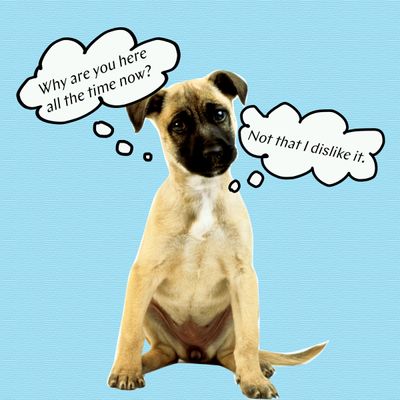
If there can be a “winner” in our current global crisis, it might be our dogs. Often left home alone while we go out to work, or to socialize, or to run errands, they are now treated to our nonstop physical presence; the consistent shuffling of our besocked feet as we fill our homebound days, participating in the isolation that is absolutely necessary to slow the spread of the novel coronavirus, no matter what our president says.
I admit, though, it sounds a bit conceited. “This is probably incredible for you,” you can imagine an unwashed human in the sweatpants she’s been wearing for five days saying to her dog as they sit on the couch in silence. “Man … you must be absolutely loving this.”
Are they loving it, though? It’s hard to tell. They can’t talk out loud or even send us little text messages to let us know how they feel, but even so, I think my dog is happy with the change. At first, it seemed like the fact that I was always around, asking him things like “Why are you the cutest little man I’ve ever seen in my life, and how did you get to be that way?” interrupted the amount of sleep he was accustomed to getting. (He would do the sleeping-while-sitting-up move practiced by puppies in YouTube videos, which was adorable, if slightly concerning.) But he seems to have adjusted to the fact that nothing is going on anyway, and he might as well just take a nap.
“Dogs are like people in this sense,” Dr. Laurie Santos, director of Yale’s Canine Cognition Center, told me. “They do get used to changes over time.” I reached out to her over email to see if she would be able to provide some insight into what might be going on in our friends’ heads during this period of uncertainty.
“Dogs don’t know about pandemics or viruses,” Santos said (admittedly because I asked her if she thought they, uh, could tell what was going on), “but they definitely know that their routine has changed, and that you’re around the house more often.”
They likely sense something has changed emotionally for you, too. Studies have shown that humans secrete odors that communicate their emotions to dogs, allowing them to be uniquely tuned in to how we’re feeling; this is how your dog always seems to know when you’re feeling sad. “They almost surely detect that we’re going through an anxious time right now,” Santos said. If you can, try to remember that if you’re emoting anxiety, your dog is going to feel it, too.
But the good news is that she thinks they’re probably happy to have us around. “Dogs are very bonded with their owners and guardians, and thus they’re probably pretty stoked to have us around more often,” she said, noting that it’s also a boon for them that one of the only outdoor activities deemed safe to participate in is dog walking. The likely slower-paced, more leisurely walks are, I’m sure, a positive addition to their lives.
Dogs, like us, just need time to adjust to the lifestyle change. This adjustment period can be sped up if you put into place, as soon as you can, a consistent at-home routine. Take them for walks at the same times every day, feed them on a normal schedule, give them regular bouts of attention. They’ll learn the routine. “The more you can be consistent, the more quickly your pup can adapt.” And it’s worth noting that having that daily framework would probably help us, too.
A co-worker of mine mentioned recently that she was concerned that her dog might be bored with her, now that she’s around all day, but Santos says she shouldn’t fret. “I’m not sure dogs will ever get bored with you,” she said, “but they probably do habituate to the initial excitement of having you around all the time.” Cold comfort, perhaps.

